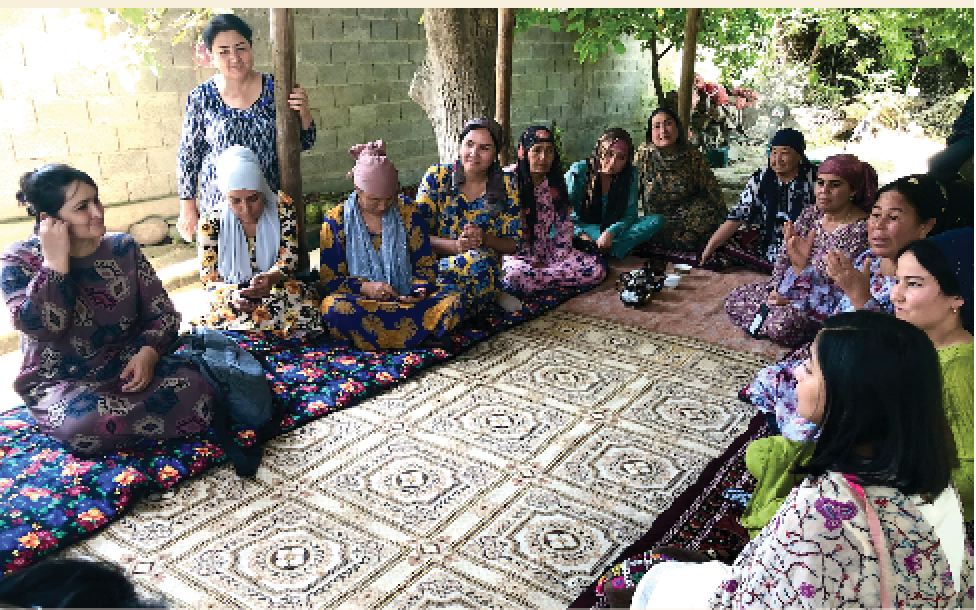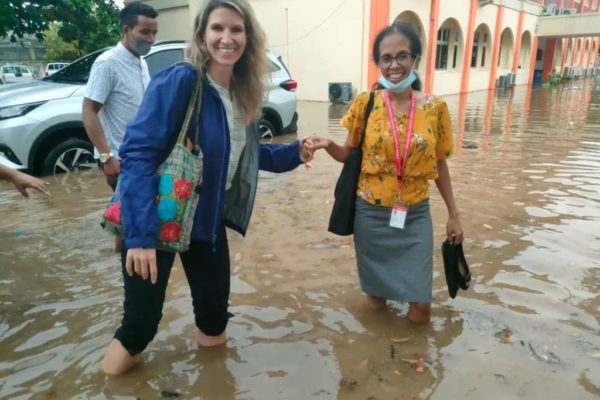by Sarah Romorini
This article was originally published in PCJH’s Fall 2022 Pinnacle, “Living Our Faith”
Dushanbe, Tajikistan, 4 weeks ago—At 3:30 a.m., only the stars were out. After two days of travel, I was grateful to be on our final approach. I wished it were dawn because we were flying over beautiful mountains: 50% of the country is above 10,000 feet and its highest peak, Ismoil Somoni, tops nearly 25,000 feet.
But I wasn’t in Tajikistan for the mountains. Pastor Ben asked me to reflect how I’ve seen God at work through my vocation in international public health. Perhaps it’s ultimately how, despite the distance, religious differences, cultural and language differences, we’re all part of one beautifully diverse team and family. We each bring our strengths and gifts to help make this world a better place– no matter what we do, no matter how humble.
Before moving back to the US a few years ago, I lived in Malawi, Argentina, and El Salvador for most of my career, working with Maternal and Child Health and Women’s Health projects. When working with women, their partners, young moms, babies, tireless nurses and doctors who have seen it all, a lot of real stuff happens. Beautiful joys, fears, uncertainties, heartbreaks, celebrations. The two bookmarks of this earthly life, birth and death, are always present. They’re often surrounded by memories of personal or political trauma, memories of war, economic poverty, lack of resources that are often taken for granted in the United States.
The team I work with in Tajikistan exemplifies the doctors who have seen it all, yet they relentlessly work to improve their country’s health. After 2 years of collaborating remotely, I was finally working in-person with our Tajik team. The US government funded project works with Tajikistan’s Ministry of Health to reduce maternal and newborn mortality in Khatlon Province, which borders Afghanistan. The country is over 90% Muslim and my colleagues heeded adhan, the beautiful calls to prayer that echo five times a day reminding the faithful it’s time to stop and pray. The team improves service quality at hospitals and Primary Health Centers, empowering pregnant women and new moms to have healthier pregnancies, make healthier decisions.
After driving south to the mountainous town of Vaksh with my team members Tahmina, Muslim, and Yuliya, we were greeted by community health workers to learn about their work. No matter the country, an amazing spirit of servitude shines through community health workers who improve the health of their communities, often with minimal pay or as volunteers. Their daily job is to put “love thy neighbor as thyself” into practice, Rain or shine, often in temperatures soaring above 100F, they visit households, encouraging them to adopt healthier behaviors and avoid the most deadly yet preventable childhood diseases in the country: diarrhea, malnutrition, and pneumonia.
In Vaksh, this group of women (above) shared how the project made their job easier, as we had equipped them with training, smartphones and an app to register basic household health information and prioritize visits to those most in need. We heard how tough it was to deliver the right message, so a woman would adopt healthier behaviors during her pregnancy, or convince husbands or mothers-in-law to allow their pregnant family member to seek prenatal care at a clinic. This behavior change for health requires incredible empathy, and I’ve appreciated the impact of this work in Tajikistan, and around the world, including the United States.
As we were leaving, I felt an urgent tug on my sleeve. One of the older women shyly gave me a beautiful, fresh round of bread. This was like a giant pizza crust that was folded in half, packed lovingly in a plastic shoe bag. She handed it to me, held my arm for a second, and I could feel the kindness and generosity that was also shared with this daily bread.
The way God’s love transcends man-made boundaries and unites us in this beautiful world reminds me of the hymn “Song of Peace”, set to Sibelius’s Finlandia: “This is my song, O God of all the nations / A song of peace for lands afar and mine.”



